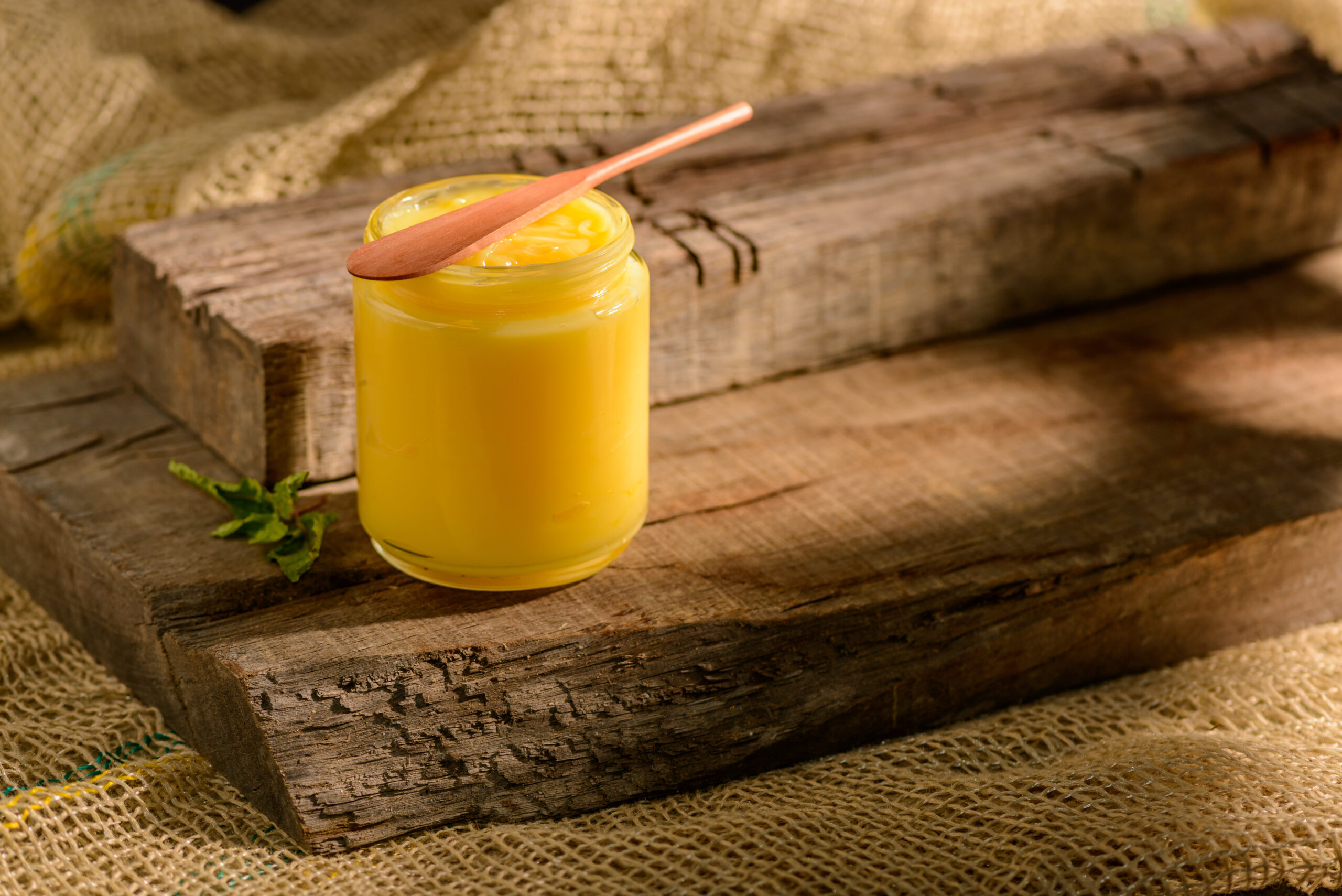
I am a huge fan of ghee! Every few weeks, I will make a batch and keep it stocked in my kitchen so that we always have it on hand for the 10 amazing benefits of ghee. Ghee is simply butter that has been cooked to remove any water and solids. It is the end result of a chemical process whereby all the butter is cooked down till all the water evaporates and the milk solids sink to the bottom of the pan. It is then strained and poured into a mason jar. As it’s a pure oil, it will not go rancid and does not need to be refrigerated. So, what is all the fuss? Modern science now verifies what Ayurvedic health science has said for thousands of years: Ghee has a host of health and cooking benefits and is good for the mind and spirit.
The primary fatty acid in butter is called butyric acid, so named because it was first discovered in butter. Butyric acid is a short-chain fatty acid (SCFA) that the intestinal tract thrives on, as it helps to protect the integrity of the gut wall. The process of making ghee yields an even more concentrated source of butyric acid than butter. However, we can make butyric acid ourselves with our own microbes.. Much of the healthy fiber that we eat directly feeds the microbes in the gut. In turn, these gut microbes convert this ingested fiber to butyric acid, the primary ingredient in ghee. The cells of the colon utilize butyric acid as their primary source of energy and a major substance for maintaining the health and integrity of the intestinal wall.
The American Society of Microbiology reported on a study that showed patients with inflammatory diseases such as ulcerative colitis and Crohn’s disease do not produce butyric acid, and have low levels of fatty acids in their intestines. In Ayurveda, taking ghee internally through ingestion and ghee enemas has been done successfully for thousands of years to support intestinal health and function. Interestingly, these studies are now proving the science behind Ayurveda.
Were you aware that in order to absorb all of the extremely healthy fat-soluble nutrients in your food, you’ve got to eat them with some fat? So maybe you add olive oil to your salads or eat your veggies with butter to help absorb all of those valuable nutrients.
But did you know that not all fats are created equal when it comes to nutrient absorption? Some work better than others and can actually enhance the amount of nutrients your body receives from the food you eat. Ghee is packed with Omega 3 and Omega 9 essential fatty acids, Vitamins A, D, E and K, and contains high levels of CLA (Conjugated Linoleic Acid), when sourced from grass fed cows. Ghee is also high in antioxidants and numerous other minerals
One recent study, published in the European Journal of Clinical Nutrition, found that substituting ghee for vegetable oils can help reduce the risk factors for heart attack and stroke. Another study published in American Journal of Clinical Nutrition found that eating saturated fats – like ghee – prevents the progression of heart disease in women with metabolic syndrome.
When fats are “unstable”, they can easily become oxidized and go rancid quickly. And that’s not so great when it comes to your health. Rancid, oxidized oils expose the body to free radicals, which can damage cells and DNA. These oils can also irritate the walls of your arteries and promote dangerous inflammation. It’s the polyunsaturated long chain fatty acids that are the most unstable of all. In fact, consuming oils that readily oxidize (including corn oil, soybean oil, palm, canola, and other “vegetable” oils) is associated with a wide range of inflammatory conditions, including heart disease, diabetes, autoimmune diseases, and even cancer. One recent study in the journal Immunity looked at the effects of dietary fatty acids and how they directly impact the central nervous system autoimmunity via the gut. This study concluded that fats with long-chain fatty acids worsen the disease. This data demonstrates a direct dietary impact on intestinal-specific and subsequently central nervous system-specific. The cell responses in autoimmunity and thus might have therapeutic implications for autoimmune diseases such as multiple sclerosis.
Ghee, on the other hand, has only about three percent polyunsaturated fat and nearly 60 percent saturated fat. It is a short-chain fatty acid, and its composition is highly stable. That means that not only can it be stored for extended periods, it also remains intact under high heat cooking, thanks to a flash point of 518 degrees F.
Ghee has been found to have protective effects against cancer, thanks in part to a powerful compound called conjugated linoleic acid (CLA). CLA acts as an antioxidant. It also reduces inflammatory compounds and encourages cancer cells to self-destruct (a process known as apoptosis). Conjugated linoleic acid or CLA is higher in grass-fed beef and in products made from their milk. This is one of the main reasons it’s important to choose grass-fed butter for your ghee. Initial studies indicate that grass-fed ghee, which is higher in CLA, reduces inflammation and actually lowers body fat.
Research published in the Journal of Endocrinology and Metabolism in 2016 looked at the effects of the healthy fat CLA on insulin sensitivity in obese children. The randomized, double-blinded and placebo-controlled study found that 37 percent of the patients treated with CLA exhibited improvements in insulin sensitivity. In addition, muscle biopsies of the subjects treated with CLA showed an upregulation of the protein molecule IRS2 that mediates the effects of insulin on the body.
Another study published in the Journal of Nutrition finds that the anti-tumor effects of CLA are enhanced by the fatty acids in ghee! In this study on mice, the researchers implanted breast cancer cells into the subjects. Some of these mice were fed a diet with a high level of corn oil, which attempted to “approximate the fatty acid composition of the American diet.” Another group received CLA in addition to the standard diet, while one final group received CLA combined with ghee. What the scientists discovered was that the growth and size of the tumors were 2.5 times larger in the corn oil group than in the mice that were supplemented with CLA. They also found that the group that consumed ghee in addition to CLA had far fewer areas where cancer had taken hold (metastases). The ghee also reduced the amount of CLA that was necessary to have an effect. In other words, ghee amplified the beneficial cancer-fighting effects of CLA.
That’s strong bones for you! As a fat-soluble vitamin, K2 plays many important roles in the body. Perhaps its most critical role is that it helps calcium move into the bones and teeth, making them stronger. It also helps calcium move out of arteries and other soft tissues. This reduces calcifications – atherosclerosis – and the risk for heart disease. Unfortunately, it is estimated that up to 80% of Americans don’t get enough of this important nutrient. The good news is that it is abundant in grass-fed ghee!
Ghee is rich in healthy fat-soluble vitamins such as vitamins A, D, E, and K. These vitamins are important for promoting bone and brain health, and for boosting the immune system. If you have gluten sensitivity, leaky gut syndrome, or any inflammatory digestive disease such as IBS, Crohn’s, or certain pancreatic disorders, it could be due to a problem absorbing vitamin A. By using ghee for cooking, you can increase your intake.
Vitamin D, also a fat-soluble vitamin, can be made in the body after exposure to sunlight. However, during those chilly, dark winter months, it can be difficult for our bodies to make enough of this vitamin. Ghee benefits the body by improving moisture and contains vitamin E, which is an antioxidant whose role is to repair damaged skin, balance hormones, improve vision and help to balance cholesterol. Fat-soluble vitamins are essential to maintaining a healthy metabolism and various biochemical functions in the body.
Why is ghee’s smoke point important? Well, it’s because you can cook and fry with ghee, and it will not break down into carcinogenic free radicals like many other oils. The oils we use, such as peanut oil, soybean oil, corn oil, and canola oil, are genetically modified and have a lower smoke point. When we heat oils above their smoke point, it destroys the essential phytonutrients. Ghee is a healthy oil that can be used in all recipes, especially those that need high heat. In addition, many fats change their fatty acid structure when heated and become unhealthy. So, for example, olive oil shouldn’t be used for cooking and should only be used to add after cooking, in dressings or sauces.
Ghee is considered one of the best ayurvedic superfoods, and we have demystified ghee and given you 10 amazing health benefits of ghee.
Want to make it yourself? Follow my YouTube video on how to make ghee, or watch the Health benefits of Ghee in your Coffee.
Download my free guide below to get more Ayurvedic staples to keep stocked in your kitchen!
Ghee is clarified butter made by cooking butter to remove its water and milk solids. The process involves heating butter until all the water evaporates, and the milk solids sink to the bottom. It is then strained and stored as a pure oil. Unlike regular butter, ghee has a high smoke point and does not need refrigeration, making it ideal for cooking.
Yes, ghee is known for its anti-inflammatory properties. It contains butyric acid, a short-chain fatty acid that supports the health of the gut and helps protect the integrity of the intestinal wall. This makes ghee beneficial for those with inflammatory diseases like ulcerative colitis and Crohn's disease.
Absolutely! Ghee enhances the bioavailability of fat-soluble vitamins like A, D, E, and K. It helps the body absorb these important nutrients more efficiently, especially when consumed with vegetables or other nutrient-rich foods.
Ghee is a stable fat because it is composed of mostly saturated fats and has a low amount of polyunsaturated fat. This stability makes ghee resistant to oxidation, which prevents the formation of harmful free radicals that can damage cells and promote inflammation. It also has a high smoke point of 518°F, making it perfect for high-heat cooking.

The Holistic HIghway integrates traditional Western medical practices with Ayurveda medicine, creating a focus on prevention through nutrition, diet, and exercise; use of the latest genetic testing and other diagnostic techniques; and prescribed combinations of botanical medicines, supplements, therapeutic diets, detoxification programs, or stress-management techniques.

Integrative Health Expert | Ayurveda Practitioner | Author | Speaker
Kerry is a globally recognized leader in integrative medicine and the science of health known as Ayurveda. She is passionate about raising awareness of the need for a change in contemporary medicine that focuses on patient empowerment and a health-based (rather than disease-based) medical system.
Kerry is connected with The University of Pittsburgh Center for Integrative Medicine and remains a pioneer in the field of integrative medicine where she has developed a personalized system to manage chronic disorders by incorporating fundamental changes in diet, behavior, and stress while focusing on genetics.
This individualized program is so successful that many of her clients have achieved maximum healing and vitality after years of chronic problems!
More to Explore